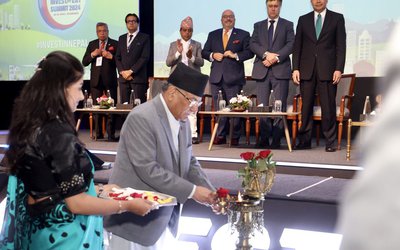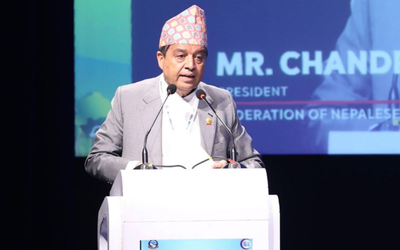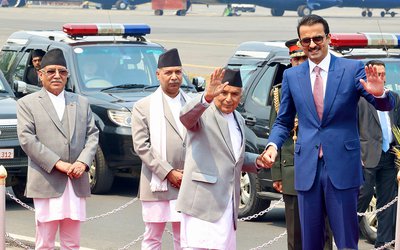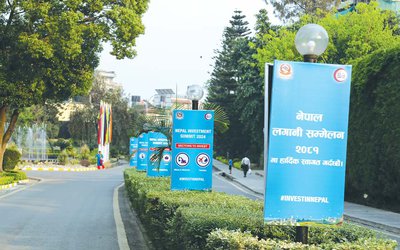Bipolar disorder is a psychiatric name given to a condition where euphoric moments of elevated energy are followed by depressive downswings. If Kathmandu were a person, it would be diagnosed as having one, be straitjacketed and confined in a padded hospital cell.
This last month has seen more oscillations of “good news: bad news” than what should be permissible by law for the health of its citizens. And one is not talking of the “leaders have met to forge a consensus” trivia against which everyone is long immunized to expect more raw differences to emerge in the aftermath. It is instead good news that is followed by counter factuals that are depressing, like the Supreme Court’s finally cracking down on corrupt politicians. It had everyone elated one day, only to learn the next day that there was a longer list of even bigger fish that would never be caught. That is because the chief justice who initiated this clean-up is retiring in a month and the other party nominees in the bench are not expected to be as strict with their benefactor-nominators.
The good news is that the government declared an “energy emergency” in a country facing 14 hours of power cuts a day for the last so many years. The bad news is that this very political combination of EhMaLeys and Maobadees had two years ago declared a similar “energy emergency” and a 38-point program to tackle it as well as to generate 10,000 MW of electricity in as many years. It will be remembered in some historical footnote as a wholly ignored enterprise whose fate the current “energy emergency-2” looks certain to share. The attempt to create an “energy triumvirate” authorized to enter any house without warrant and to shoot occupants if resisted, to put those protesting bad hydropower projects in jail for five years, to cancel or award licenses at will bypassing the Ministry of Energy, the NEA or the Water and Energy Commission are not measures that will excite the already wary national or international financial investors. And the main partner in the coalition, the Maoists have already declared at a press conference that they were not consulted by the EhMaLey finance and energy minister before making this declaration, that they disagree with some of its key provisions and (as became apparent at an interaction with their MPs) they suspect their other coalition partner the EhMaLeys of trying to use this crisis to promote their cadre’s hold on hydropower licenses.
It was good news that Nepal’s oldest institution, the Nepal Army was no longer treated as a pariah, at least by one major emerging super power. The bad news was that an aid agreement was signed with it, not by its ambassador and our finance secretary, but by the two army chiefs, albeit under a portrait of Prithvi Narayan Shah. Even more depressing to a liberal democrat, not a squeak of protest was heard from those civil society thekedars who have in the past cried themselves hoarse about “civilian supremacy”. Maybe they ran out of their Western INGO ‘inclusiveness and conflict resolution’ munificence to buy candles for a vigil at the Maitighar Mandala! Nepal seems to be falling headlong into the post-colonial 1950s similar to Pakistan, Nigeria and Congo: democratic experiments conducted by less-than-democrat politicians leads to anarchy, the army steps in to restore order, and the kleptocrats quickly change colour and sides.
The good news is that the President has begun, like a headmaster, to call errant schoolboy politicians not doing their assigned homework to shape up. The bad news for Loktantra is that he is doing exactly what King Gyanendra had to do as head of state when the parliament had imploded and squabbling politicians were unable to bring the ship of state to even keel. Even worse news for the President is that King Gyanendra as king at least had the weight of tradition behind him, he had Article 127 of the constitution that an all-party consensus had activated for him to use, and he still had the 1990 constitution that he was committed to bring back on track through fresh elections. Ram Baran Yadav is distrusted by the Maoists for the Katwal episode, by the Sher Bahadur faction of the Kangress for openly lobbying for the Koirala faction during the party convention, and by Jhalanath Khanal for being an ‘active president’ bypassing the prime minister in political consultations. He has no Article 127 for backup and the Interim Constitution is in tatters anyway; and there is no provision to call for an election of anything in it. And the office of the president has not managed to strike a single self-confident root that is not a desperate imitation of the sidelined monarchy. How he and the political parties will react to the May 28 Damocles Sword, and how the rest of the country will react is as wild a guess as it gets.
Such bipolar disorder is the result of an unfortunate infantile romanticism within a dominant faction of Nepali public thinking. Healthy open societies start with a problem, a realistic public assessment of the context within which the problem exists and a search for incremental solutions whose implementation is constantly monitored and corrected and which would not completely destabilize the system. This is the path of sustainable evolution. Unfortunately we suffer from revolutionary romanticism where an irresistible urge takes over the body polity to “wipe the slate clean” and start re-drawing everything according to some fanciful master plan. In more revolutionary cases than one, global history tells us that the paranoia of the new political masters takes over, most of what is good of the old (but very little of the bad) is destroyed, and the new never gets built on the rubble of the past. This is where New Nepal is today, five years after the euphoria of 2006, stuck in a blind alley with a defunct Constituent Assembly and squabbling party warlords, even worse than 1958, 1997 or 2002.
An evolutionary, rather than a revolutionary thinking would have allowed us to balance the best of tradition with the most promising of incremental changes. The attempt to effect revolutionary change has left us with ruins and rue. It would have been less destabilizing if in 1951 we had taken Padma Sumshere’s 1948 constitution and simply improved upon it. In 1990, if just the word “partyless” in the 1962 Panchayat constitution had been removed, a more stable democracy resting on well-tested administrative and judicial foundations would have ensued and might not have seen the emergence of a bloody civil war that took 14,000 lives. In 2006, we do not need to speculate if appropriate amendments to the 1990 democratic constitution might have given us a more stable Nepal: the godfather of this federal republic Girija Koirala himself admits as much in his just published memoirs.

Dipak Gyawali
Gyawali is Pragya (Academician) of the Nepal Academy of Science and Technology (NAST) and former minister of water resources.
- Maldevelopment And Technology: Ethos Harbingering Coming Apocalypse
- Apr 03, 2024
- World Social Forum: Rethinking and Redefining Development Itself
- Feb 21, 2024
- Remembering An Inspiring Karma Yogi
- Jan 09, 2024
- New World Disorder And The Case For Ideology
- Dec 13, 2023
- Loktantra’s Moral Turpitude
- Nov 06, 2023















